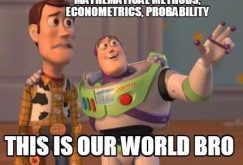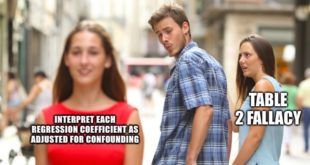Econometricians would like to project the image of agricultural experimenters who divide a farm into a set of smaller plots of land and who select randomly the level of fertilizer to be used on each plot. If some plots are assigned a certain amount of fertilizer while others are assigned none, then the difference between the mean yield of the fertilized plots and the mean yield of the unfertilized plots is a measure of the effect of fertilizer on agricultural yields. The...
Read More »Interpreting confounder and modifier coefficients
Interpreting confounder and modifier coefficients The problem with a table presenting multiple estimated effect measures from the same model (“Table 2”) is that it encourages the reader to interpret all these estimates in the same way, typically as total-effect estimates. As illustrated above, the interpretation of a confounder effect estimate may be different than for the exposure effect estimate. Of course, it is possible that some secondary reported...
Read More »On gender and alcohol
On gender and alcohol Breaking news! Using advanced multiple nonlinear regression models similar to those in recent news stories on alcohol and dairy and more than 3.6M observations from 1997 through 2012, I have found that drinking more causes people to turn into men! Across people drinking 0-7 drinks per day, each drink per day causes the drinker’s probability of being a man to increase by 10.02 percentage points (z=302.2, p<0.0001). Need I say,...
Read More »Causal inferences — what Big Data cannot give us
Causal inferences — what Big Data cannot give us .[embedded content] The central problem with the present ‘Machine Learning’ and ‘Big Data’ hype is that so many — falsely — think that they can get away with analyzing real-world phenomena without any (commitment to) theory. But — data never speaks for itself. Data by themselves are useless. Without a prior statistical set-up, there actually are no data at all to process. Clever data-mining tricks are not...
Read More »The 25 Best Econometrics Blogs
The 25 Best Econometrics Blogs Yours truly, of course, feels truly honored to find himself on the list of the world’s 25 best econometrics blogs. 1. Bruno Rodrigues 7. Eran Raviv Blog Statistics and Econometrics 9. How the (Econometric) Sausage is Made 14. Lars P Syll Pålsson Syll received a Ph.D. in economic history in 1991 and a Ph.D. in economics in 1997, both at Lund University. He became an associate professor in economic history in 1995 and has since...
Read More »Econometric testing
Debating econometrics and its shortcomings yours truly often gets the response from econometricians that “ok, maybe econometrics isn’t perfect, but you have to admit that it is a great technique for empirical testing of economic hypotheses.” But is econometrics — really — such a great testing instrument? Econometrics is supposed to be able to test economic theories. But to serve as a testing device you have to make many assumptions, many of which themselves cannot be tested or...
Read More »The econometric illusion
What has always bothered me about the “experimentalist” school is the false sense of certainty it conveys. The basic idea is that if we have a “really good instrument” we can come up with “convincing” estimates of “causal effects” that are not “too sensitive to assumptions.” Elsewhere I have written an extensive critique of this experimentalist perspective, arguing it presents a false panacea, andthat allstatistical inference relies on some untestable assumptions … Consider...
Read More »Combinatorics (VI)
In my library, there are n philosophy books and six economics books. If yours truly can choose two books of each type in 150 ways, how many philosophy books are there in my library?
Read More »Do complex numbers exist? (wonkish)
Do complex numbers exist? (wonkish) .[embedded content]
Read More »Christmas combinatorics
Yours truly has invited five of his colleagues to share a Christmas lunch with him around the circular dinner table in his kitchen. Unfortunately, two of the colleagues are not on speaking terms with each other, so they cannot be seated together. In how many ways can we be seated around the table?
Read More » Heterodox
Heterodox






